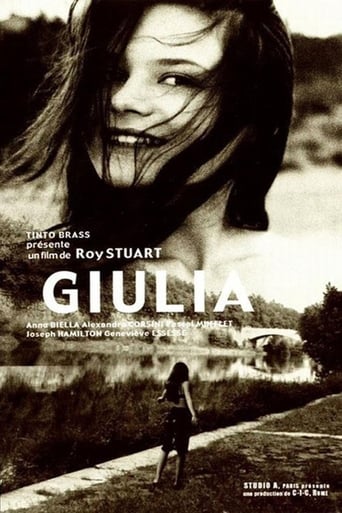

Thanks to Roy Stuart for this film and the wonderful scene with Tina Aumont. Tina is as usual amazing and what she says is very close with her private history. In my "Waiting for Tina" biography I am glad to write about this scene and its particular atmosphere. "Rome unique objet de mon ressentiment", but not only. It was a town of freedom and experiments on the late sixties and the early seventies and some film producers like Tinto Brass proved it. In Giulia, the music goes perfectly with the picture and the four male characters shown in "Giulia" are a good vision of human being : sex addiction, alibi of faith and brain work, taste for lie, lack of social projects. Maybe it would have been interested to see the evolution of "Giulia" in a second time.Jean Azarel
... View MoreAs a movie-freak I get to see perhaps almost as many movies as an official critic and, like a critic, I am always looking for The One, the film that stands out from the (vast) crowd and makes you think you haven't wasted any precious time in the watching. But more than that, the one that makes you feel a sense of gain, moving forward in some way, in your thinking or even in your perception of certain things. Only master film makers can make you feel like this, from Tarantino to Eastwood, from Jackson to Spielberg. Then of course you have the rogue directors, the rebels against convention who want to show you something different, not just for different's sake but because they are themselves motivated and inspired by things most people haven't yet approached or experienced. Bergman was such a director, as were the great Italians, Pasolini, Visconti and Fellini, and still we have Bertolucci. Now I find a New Yorker turned Parisian, whose work calls to mind some of these Masters, but through an influence that is subtle enough for it to be subconscious rather than a heavy handed copying of style and technique. Roy Stuart is a new comer to film but by no means to photography - erotic photography - the medium in which he has established himself thoroughly as a Master, admired and collected by large numbers of fans throughout the world. That he has turned from still photography to the moving kind is to our gain, as although young at the medium, he uses it with an almost equal mastery that he uses his still camera, and I don't believe anyone seeing his first film, Giulia, will doubt that he will even surpass in film what successes he has achieved in the world of the erotic photographer. What Roy Stuart achieves - for me - in this first film is the remarkable quality of eroticism throughout, even when the subject before us is not apparently erotic at all .but it is, for him, and he passes that feeling on; it is for him present in the deepest Freudian sense, that is to say ever-present in all situations, in our very beings. And so after watching a work by Stuart one has the almost uncanny feeling that one has just been watching very close friends in their private moments because what one has actually been watching is a glimpse into a part of oneself with which we haven't necessarily been too familiar before. All great films make us feel this in different ways or measures and we can now welcome Roy Stuart into the great arena of those who make us more aware - as well as entertaining us in the extreme.
... View MoreBeing a fan of the works of Tinto Brass the day would eventually come when I had to see "Giulia". I have read about this movie before, but against my will "Giulia" was the last one from 12 short movies from "Corti circuiti erotici" series (produced by T.Brass) that I happened to see. I started comparing "Giulia" with them all while watching, but somewhere on 20+ minute I realized that this movie stands alone. It is something more than "one of the 12". I was silent, I was in shock, I was amazed. "Oh, how beautiful this movie is! How lovely and again beautiful!". After that night "Giulia" was dominating in my thoughts for several days, and I decided to watch it again to see what does this movie want from me.Strange thing happened then.... The middle of the movie (when I was "captured" for the previous time) and the second half passed without that emotional uplift I experienced for the first time. But this time I was noticing interesting camera work here and there! Some reviews say that camera work is. well . not that good. Maybe, I'm not a professional. But I liked it. Emotional aspect worked again (from the different angle though). Did I face another side of the experience of watching "Giulia"? How many layers does this movie have? What should come next? I am excited again and will watch it again and again.Another fact, I believe, worth to be mentioned here to make for the movie. French portions of movie (most of it, in fact) are almost locked for my understanding, so I only got the idea of the action from movie itself and from all those reviews posted here and there. Nevertheless, I don't feel uncomfortable when watching, and the actors' play support my perception very well. So, am I speaking about feelings and emotions here again? Soundtrack, although with annoying stops in musical parts here and there, supports the movie in the best way. You're floating down the stream of movie when get in harmony with sounds not only music, but voices.Understanding this movie may be difficult, of course. Just like understanding women. Maybe one should not force himself or herself to understand it, but rather try to feel? And give another try later and see what comes then?
... View MoreGIULIA, The celebration of the FemaleI advise you to buy the director's cut of this great one hour film direct from the director himself since it contains none of the technical faults of the Tinto Brass version. This is an erotic film in the noblest sense of the term. It connects beauty and sensuality with images that are sometimes crude but always poetic. The sex scenes are perfectly integrated into the narrative resulting in a "poetic realism". With Stuart, the sex is real-direct, natural but also exalted, magnified a gift for the eyes.ANNA BIELLA's commanding presence illuminates this film with her eyes, her contralto voice, her gestures, and her expressions.. Her acting allies vivaciousness and sweetness, naturalness and sophistication. Through her character, Stuart conveys an anticlerical humanist message. Giulia is an independent young woman who is prepared to offer her body and her spirit against all the religious taboos. The film is a kick in the face to all the up tight puritans that construct moral walls against the natural flow of life. This is exemplified is the final section dealing with the Pope and the devil as well as when she urinates against the Vatican wall. Stuart is the enemy of repressive moral and social routines. There is the drama teacher who thinking only of his own pleasure, is put to the test by Giulia who chooses where and when she wants to have sex with him; she invites him to a live sex show and beckons unsuccessfully for him to join her on stage. Stuart condemns him as he condemns male selfishness, religious fanaticism and all that works against human liberation, particularly when it targets that of the woman-like the the foot fetishist and the aggressor in the park, disruption and aggressiveness are attitudes essentially masculine. Giulia says to the drama teacher, "when one is a man you should seek to understand women". And when one is also an artist, to celebrate them but for that celebration, like the opera singer in "Capriccio" it's the woman who is at the heart of the creation, before the composer, the writer and the director: three men, three artists that depend on her. Bokonon, Août 2006
... View More